| Srl | Item |
| 1 |
ID:
121057
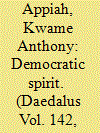

|
|
|
|
|
| Publication |
2013.
|
| Summary/Abstract |
There is a famous paradox about democracy: most forms of participation make no obvious difference to political outcomes and yet people act anyway. I argue that they are more likely to act politically if they have certain attitudes and commitments; and that productive attitudes of the right kind can be sustained by a culture in which two kinds of honor are central. One kind of honor is collective: it is the honor of nations, which is the concern of the patriot. Another is the honor of citizens, who are worthy of respect because they contribute to the practices that serve the republic. I suggest some practices we Americans might want to take up and honor for the sake of our own republic today, drawing attention to two discoveries in social psychology that could be productively brought to bear in our political life: namely, the Ben Franklin effect and the Contact Hypothesis.
|
|
|
|
|
|
|
|
|
|
|
|
|
|
|
|
| 2 |
ID:
090382
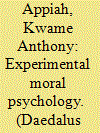

|
|
|
| 3 |
ID:
163296
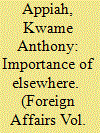

|
|
|
|
|
| Summary/Abstract |
In October 2016, British Prime Minister Theresa May made her first speech to a Conservative conference as party leader. Evidently seeking to capture the populist spirit of the Brexit vote that brought down her predecessor, she spoke of “a sense—deep, profound, and, let’s face it, often justified—that many people have today that the world works well for a privileged few, but not for them.” What was needed to challenge this, May argued, was a “spirit of citizenship” lacking among the business elites that made up one strand of her party’s base. Citizenship, she said, “means a commitment to the men and women who live around you, who work for you, who buy the goods and services you sell.” She continu
|
|
|
|
|
|
|
|
|
|
|
|
|
|
|
|
| 4 |
ID:
074615
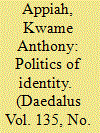

|
|
|
| 5 |
ID:
137565
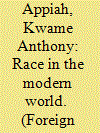

|
|
|
|
|
| Summary/Abstract |
In 1900, in his “Address to the Nations of the World” at the first Pan-African Conference, in London, W. E. B. Du Bois proclaimed that the “problem of the twentieth century” was “the problem of the color-line, the question as to how far differences of race—which show themselves chiefly in the color of the skin and the texture of the hair—will hereafter be made the basis of denying to over half the world the right of sharing to their utmost ability the opportunities and privileges of modern civilization.
|
|
|
|
|
|
|
|
|
|
|
|
|
|
|
|